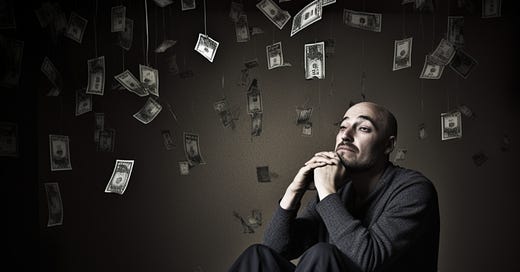A few years ago, my friend struck digital gold in crypto and retired very comfortably in his mid-30s.
I’d be lying if I said I wasn’t extremely proud of him.
But I’d also be lying if I didn’t say I wasn’t extremely jealous, too.
He’s managed to bypass decades of the daily grind, swapping the office for a beachside villa, and conference calls for leisurely strolls on the sand. It's tempting to be snarky about crypto winners’ seemingly undeserved success, but their story isn’t unlike that of the lottery winners above.
Just as with lottery winners, there's a widespread belief that sudden wealth from crypto investments can lead to ruin.
However, the truth is not so simple.
Lottery Winners Lose All Their Money
It's a common narrative: an ordinary person strikes it rich in the lottery, only to find themselves overwhelmed by the sudden influx of wealth.
Swarmed by opportunistic relatives, friends, and strangers, they indulge in luxury cars and mansions, only to squander their newfound fortune within a few short years.
This "lottery curse" is supported by statistics such as the National Endowment for Financial Education's claim that 70% of lottery winners eventually go bankrupt. Additionally, a 1978 study led by psychologist Philip Brickman found no correlation between winning the lottery and happiness.
These findings have been cited thousands of times, reinforcing the idea that a windfall of wealth ultimately leads to ruin.
This cautionary tale aligns with our societal values of hard work and modesty, confirming that the daily grind may be the best path after all.
But What’s in a Bet, Anyway?
Did you know the first recorded evidence of a lottery comes from the Han Dynasty in China, between 205 and 187 BCE?
These early lotteries—a form of keno!— were used to finance major projects such as the construction of the Great Wall of China and other large ineffective bureaucratic expenditures.
The concept of a lottery gradually spread across the world, with the first European lottery with cash as a prize taking place in 1445 in the town of L'Ecluse, in present-day Belgium.
Over time, it’s taken many forms and served various purposes, from funding wars and public works to supporting charitable causes. The lottery has endured and evolved, much like our perceptions of luck and wealth.
The Truth About Lottery Winners
Contrary to popular belief, the National Endowment for Financial Education denies ever providing the 70% bankruptcy statistic. Moreover, Brickman's study, while groundbreaking at the time, has its flaws, including a small sample size and unaccounted differences between the lottery winners and the control group.
Recent research paints a completely different picture of lottery winners.
A 2020 study in Singapore found that winners experienced improved sleep, reduced anxiety and depression, and a lower incidence of mental illness. A German study in 2019 showed winners enjoy better psychological health and overall life satisfaction.
Moreover, lottery winners are generally quite responsible with their newfound wealth. NYU economics researcher Dr. Cesarini saw “that people who won large sums of money were still wealthier 10 years after the fact, compared to people who won small sums of money.”
And surprisingly, the wealth didn’t make most of them lazy, either.
“If you look at things like labor supply – the people who win large sums of money do cut down on work but it’s quite rare for them to quit altogether. They cut down mostly in the form of taking longer vacations.”
The lottery curse myth has been around since the late 1800s, and gained traction with the rise of new lotteries and larger jackpots after World War II. However, the reality is that most lottery winners lead better lives post-win, enjoying greater wealth, happiness, and health.
These stories may not make headlines, and many winners maintain a low profile, but the fact remains that luck can indeed buy happiness, whether or not it aligns with our meritocratic ideals.
Much like why your boss is probably not the best candidate for their job, lottery winners have a lot of luck to thank for their success—even if they don’t acknowledge it.
On the flip side, if you want something that’s almost a sure bet for the same $5, you could always go here.
Written by a JJ Pryor who wouldn’t mind winning the lottery…one of these days.
👋Share Pryor Thoughts on Twitter, Facebook, or another evil social media?👋





